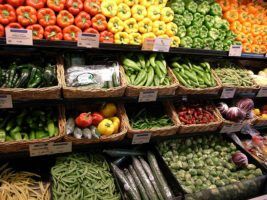

Environment
7 Types of Vegetarians and Their Impact on Your Health and the Environment
The term vegetarian came into use in 1839 and referred to people who ate a plant-based diet. However, this type of lifestyle has been in existence from the beginning of time. Some notable vegetarians include Confucius, Plato, Leonardo da Vinci and Henry David Thoreau.
In modern times, as in the past, there are many different interpretations of a vegetarian lifestyle, which can be placed in several categories and go by many different names. Some people believe that veganism, which is a diet devoid of any type of animal product, is the ultimate way to showing kindness to animals and protecting the environment. Others use the name pollotarians or flexitarians which infer they are semi-vegetarians. Most vegetarians feel that by limiting or eliminating animal-based foods from their diet, they are benefiting the animal kingdom and the planet.
Because there are so many different types of vegetarianism, some people need clarification on which type of vegetarian lifestyle they want to lead. There are seven major categories of vegetarianism, each has a different level of commitment. However, it’s important to note that with each version of vegetarianism, a person adopting this type of diet will not only see an improvement in their health but also feel the joys of doing something to benefit animals and the environment.
The Vegan
A person practicing veganism does not consume animal products or animal by-products. A person living a vegan lifestyle does not use any type of products that are animal based or tested on animals. A vegan, therefore, would not only stop eating meat but also dairy products and foods using animal ingredients, including gelatin, albumin, rennet, and honey. A vegan may also avoid using sugars that were processed with animal bone char.
Impact and Benefits
Studies show that for every person eating a vegan diet, approximately 200 animals are saved each year. Generally, vegans are healthier than people who eat animal-based diets. A vegan would experience fewer incidents of cancer deaths or cardiac failure. By adopting a vegan lifestyle a person is able to make a positive impact on the environment by saving water, lessening pollution and helping to reverse land degradation that can be caused by growing and processing animal-based products.
The Lacto Vegetarian
A lacto vegetarian does not consume meat, fish, fowl, poultry or eggs. However, they do use dairy products. So, as a lacto vegetarian, you can eat cheese and yogurt and drink cow or goat’s milk. This diet allows for the consumption of the dairy products from an animal, but not the consumption of the animal meat.
Impact and Benefits
A lacto vegetarian’s health will benefit from eating a meatless diet. This type of vegetarian has a lower risk of certain diseases, including low blood pressure. Since a lacto vegetarian consumes cholesterol through dairy products, they may have some health issues related to the consumption of animal-based dairy products. Because a lacto vegetarian does not consume animal meat, they save a large number of animals, although less than a vegan.
The Ovo Vegetarian
The ovo vegetarian does not consume meat, fowl, fish, poultry or dairy products. However, they do eat eggs and egg-based products. The type of eggs normally eating by ovo vegetarians are from egg-laying hens, although they may consume eggs from other birds.
Impact and Benefits
The ovo vegetarian gains many of the benefits of a meat-free diet. However, as with the lacto vegetarian they ingest cholesterol in the form of eggs. By eliminating meat from their diet, they are able to save some animals and benefit the environment.
Lacto-ovo Vegetarian
Lacto-ovo is the most popular type of vegetarianism. A lacto-ovo does not eat meat, fowl, fish or poultry. However, they are able to consume foods that contain dairy or eggs.
Impacts and Benefits
Many lacto-ovo vegetarians experience an improvement in their health when they change to this form of vegetarianism, from a meat-based diet. The cholesterol levels may be significantly higher than a person who is a lacto vegetarian or an ovo vegetarian since they would be consuming both dairy and eggs. Since the person is still avoiding the consumption of meat, this diet does help animals and improve the environment.
The Pollotarian
Pollotarian is a controversial form of vegetarianism. A Pollotarian avoids all forms of meat, except fowl and poultry. They avoid meat, fish, and seafood. However, since they are eating poultry, most people don’t consider them vegetarians.
Impacts and Benefits
A pollotarian would see the health benefits of avoiding red meats. Poultry is more heart healthy than red meats, so a pollotarian would have less risk of heart disease than a person who consumed red meat. A pollotarian does save some animals since they limit their consumption to poultry and fowl. But depending on the amount of poultry consumed, a pollotarian may not be saving any animals at all.
The Pescatarian or Pescetarian
The Pescatarian or Pescetarian is similar to the pollotarian, except they consume seafood and cook fish instead of poultry. As with the pollotarian, many people feel that this is not truly a form of vegetarianism because it is not solely plant-based.
Impacts and Benefits
A Pescatarian or Pescetarian will see health benefits if they are changing from a meat-based diet to a seafood and fish based diet. However, because many kinds of seafood are full of mercury and other pollutants, this diet may lead to other health issues. This type of diet also supports commercial fishing practices which may be harmful to the environment. A Pescatarian does save other types of animals from factory farms which can help the environment.
The Flexitarian
Flexitarian is the newest type of vegetarianism. A flexitarian primarily consumes a plant-based diet, but they allow themselves to eat meat and meat-based products. The amount of meat a flexitarian eats is a personal choice. Many flexitarians consume a plant-based diet and only allow themselves to eat meat-based foods on occasion.
Impacts and Benefits
While a person who eats a vegan diet will experience the most health benefits from a lifestyle change to vegetarianism, research has shown that eliminating meat for one day per week can have a positive impact on a person’s health. Reducing meat consumption can save some animals that would otherwise be used for food. Participating in Meatless Mondays can offer a person the opportunity to reduce their risk of certain illness and help to improve the environment.


 Environment12 months ago
Environment12 months agoAre Polymer Banknotes: an Eco-Friendly Trend or a Groundswell?

 Features11 months ago
Features11 months agoEco-Friendly Cryptocurrencies: Sustainable Investment Choices

 Features12 months ago
Features12 months agoEco-Friendly Crypto Traders Must Find the Right Exchange

 Energy11 months ago
Energy11 months agoThe Growing Role of Solar Panels in Ireland’s Energy Future





























